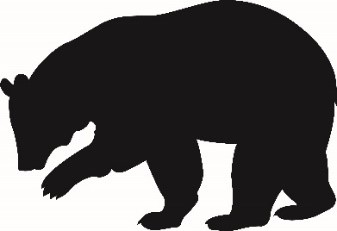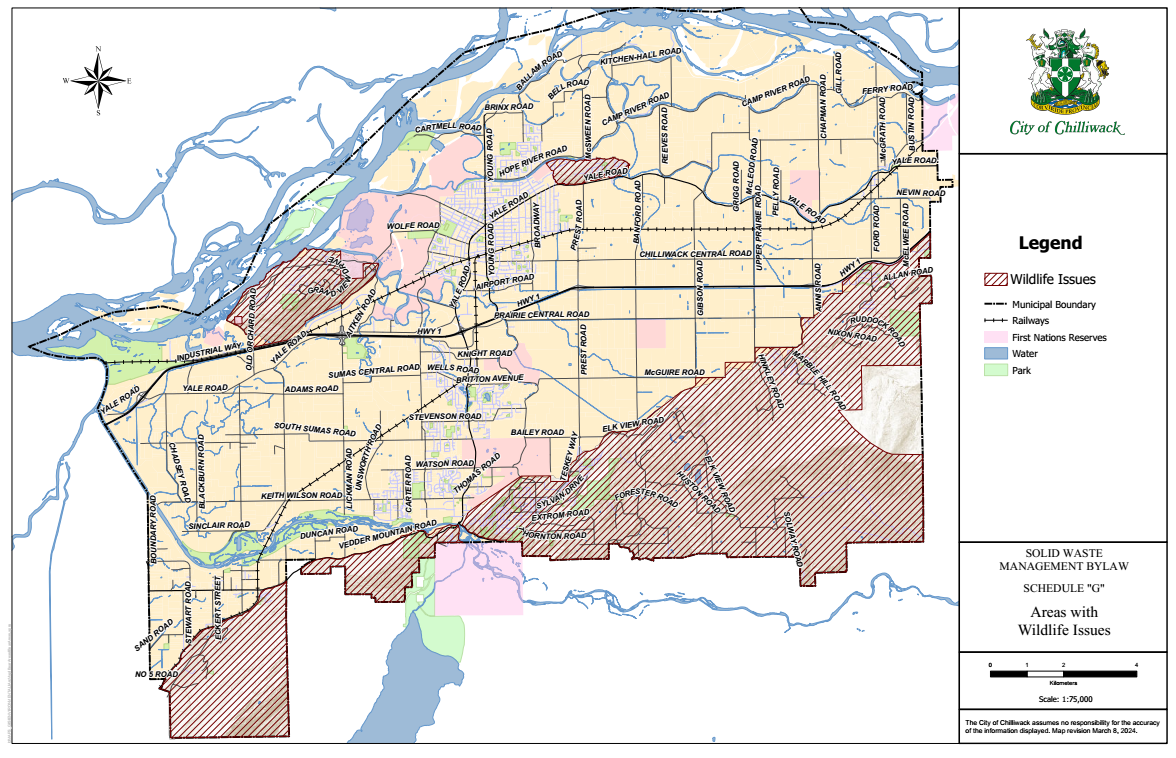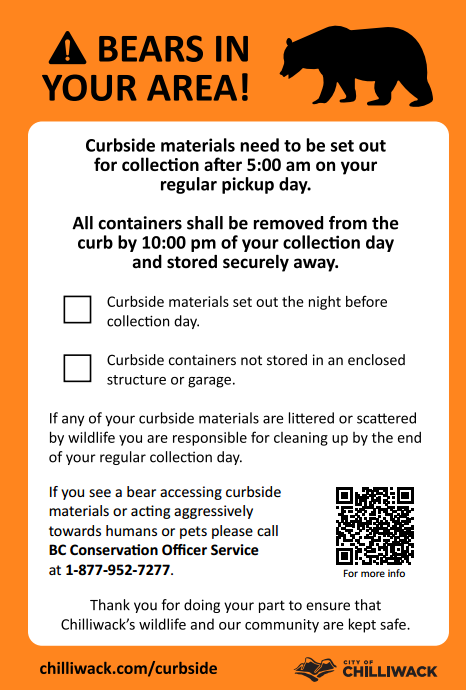Wildlife
Wildlife and Waste Information Session 2025
The Wildlife and Waste Information Session video is now available to view for residents who couldn’t attend the event. The presentation is also available for download.
Be Bear Aware
The hillside communities in Chilliwack are prime habitats for bears, cougars, coyotes, deer, and many other wildlife. Please help keep wildlife wild and our community safe by responsibly managing your waste.
If you see wildlife acting aggressively toward humans or pets, please call BC Conservation Office Service RAPP line at 1-877-952-7277.
There has been overwhelming reporting with bears accessing curbside materials and Conservation Officers may not have the resources to attend to those calls. Therefore, the Conservation Officer Service has been forwarding calls regarding bears accessing curbside materials to WildSafeBC and the City so that we can perform audits and bring more awareness to those residents in problem areas. It is encouraged that residents report sightings of bears accessing waste to both WildSafe BC and the City of Chilliwack directly to receive a faster response:
- WildsafeBC – [email protected] or 604-649-6921
- City of Chilliwack – [email protected] or 604-793-2787

Bears have a keen sense of smell and are easily attracted to readily available food sources such as garbage and compost. Bears that fail to find a food source will often move on, however, bears that become highly food-conditioned and habituated to humans are often destroyed because of concerns for human safety.
According to the updated Solid Waste Management Bylaw, all residents located within an area with wildlife issues (see map below) must ensure garbage, recycling, compostable waste, and associated containers are stored in a way that is not accessible to wildlife. When not at the curb, please store containers inside the garage, or another enclosed structure, to further prevent access by wildlife. Residents must only place materials out for curbside collection after 5 am on the morning of collection to help prevent bears and other wildlife from accessing waste overnight. All containers must be returned to their secure storage place by 10 pm on your collection day.
Even residents who are not in designated areas with wildlife issues are encouraged to follow the best practices and minimize the amount of time their materials are at the curb to reduce the risk of wildlife accessing waste.
Map of Areas with Wildlife Issues
Below is a map designating all hillside neighborhoods as areas with wildlife issues. These areas include but are not limited to Promontory, Ryder Lake, Eastern Hillsides, Chilliwack Mountain, Majuba Hill, Riverstone Heights, and Little Mountain (including Brentwood Drive Area and end of Quarry Road).

Collection Schedule Changes
Hillside residents cannot place curbside materials out until after 5:00 am on their collection day (no materials out overnight). Additionally, residents who live in the designated areas with wildlife issues are required to store their waste and waste containers in an enclosure and/or in a way that is inaccessible to bears and other wildlife.
-
Residents who live in areas with wildlife issues will automatically be required to set out their containers at the prescribed times.
-
Information stickers may also be placed on waste containers observed at the roadside overnight. The first sticker will be left as a warning, followed up with a letter. Additional observations of curbside materials left at the curb overnight may result in fines. The City wants to provide the residents an opportunity to comply before a final notice is given and a $200 fine is issued (Bylaw Notice Enforcement Bylaw).

Curbside Material Best Practices
-
Reduce odours by freezing smelly food waste and disposing of it on the day of collection.
-
Rinse recycling materials to remove food residue. Even with rinsing mixed-recycling often contains traces of food residue and odours which may attract bears so it is important to secure these bins and only place them out on regular collection day.
Curbside Container Storage and Placement
-
Keep all containers securely stored inside a garage or another enclosed structure until collection day.
-
Ensure all your containers have tight fitted lids.
Tips to Minimize Interaction with Wildlife
Other Wildlife Attractants
-
Manage fruits trees and berry bushes by picking fruit as it ripens and avoiding it collecting on the ground.
-
Feed pets indoors and keep bowls and food containers inside.
-
Bird feeders often become bear-feeders so please only feed birds during the winter months when bears are hibernating and natural bird food is limited.
-
Keep your barbecue clean and free from odours by burning off the grill every time after use and cleaning out the grease traps.
-
Manage your compost properly and have equal amounts of brown and green materials added to reduce odours.
-
If you have chickens, bees or small livestock, use a properly installed and maintained electric fence. Store all your feed in a secure location and ensure feeding areas are clean and free of attractants.
For more tips, including what to do if you encounter a bear, visit wildsafebc.com.
Report Wildlife Sightings
The Province of BC provides a 24-hour Conservation Officer Service reporting line that is used by the public to report human-wildlife interactions where public safety may be at risk. The reporting line is known as the Report All Poachers and Polluters (RAPP) line and can be reached at 1-877-952-7277 or #7277 on Telus Mobility Network or report the incident online with the link below.
Community Support
Province of BC
In British Columbia, through the Provincial Wildlife Act the province is responsible for the management and health of wildlife. Through conservation and wildlife health programs, they ensure wildlife and their habitats thrive and at the same time reduce the human-wildlife conflict.
The province also created the Report All Poachers and Polluters (RAPP) hotline to report wildlife-human interactions where public safety may be at risk. The RAPP program is a toll-free tip line and online service that also allows you to report known or suspected violations of fisheries, wildlife, or environmental protection laws anonymously and without risk of confronting the offender. It is available 24 hours a day and can be reached at 1-877-952-7277 or #7277 on TELUS Mobility Network or report the incident online with the link below.
WildSafeBC
WildSafeBC is the provincial leader in preventing conflict with wildlife through collaboration, education and community solutions. They provide wildlife facts, safety advice and conflict reduction strategies for wildlife species in British Columbia. They also have different programs to increase awareness and reduce human-wildlife conflicts. WildSafeBC has local coordinators to deliver education and outreach activities to residents living in Wildlife Areas.
According to WildsafeBC, a total of 1022 wildlife reports were made to the Conservation Officer Service in the FVRD for the year 2024. The top three species were black bears (807 reports) which is lower compared to 2023 (1209 reports), cougars (56 reports), and coyotes (30 reports). Chilliwack had 212 calls for black bears, of those 95 were bear sightings, 76 were food conditioned, 7 were damaged properties and 4 were bears in back yards.
From April to November 2024, the local WildSafeBC Community Coordinators performed outreach activities in the FVRD area. They visited 4 elementary schools with a total of 667 students and door-to-door education to 690 homes with door-hanger information. In addition, they had display information booths at parks, trailheads, campgrounds, and community markets where they had interacted with more than 1700 residents. With all their efforts in education for the community, the City will continue to provide extra funding to partner with WildSafeBC in 2025.
In Spring 2025, WildsafeBC collaborated with the City of Chilliwack and BC's Conservation Officer Services to host a Wildlife and Waste Information Session at Chilliwack City Hall. Information was provided on ways to reduce wildlife conflicts by responsibly managing waste and other attractants in Wildlife Areas. Residents who live in Wildlife Areas were invited to attend, provide feedback, and have the opportunity to speak to a Conservation Officer, a WildsafeBC representative, and staff from the Environmental Services department.
The PowerPoint Presentation document is available to view.
For more information about WildSafeBC please visit their website Home – WildsafeBC.
| Attachments | |||
| Description | Date | File Size | |
| Map of Areas With Wildlife Issues | 2024-04-03 | 6.12MB | |
| Wildlife and Waste Information Session May 2025 - PowerPoint Presentation | 2025-05-12 | 11.00MB | |
| Wildlife and Waste Information Session Q & A - Spring 2024 | 2024-07-03 | 175KB | |
| WildSafeBC Brochure | 2025-06-23 | 7.41MB | |
